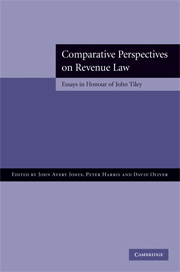Book contents
- Frontmatter
- Contents
- Contributors and affiliations
- Foreword by Dave Hartnett
- Foreword by Hugh Ault
- 1 A comparison of statutory general anti-avoidance rules and judicial general anti-avoidance doctrines as a means of controlling tax avoidance: Which is better? (What would John Tiley think?)
- 2 The judicial approach to avoidance: some reflections on BMBF and SPI
- 3 Comparing the application of judicial interpretative doctrines to revenue statutes on opposite sides of the pond
- 4 Abuse of rights and European tax law
- 5 The US legislative and regulatory approach to tax avoidance
- 6 The law of taxation and unjust enrichment
- 7 The history of royalties in tax treaties 1921–61: Why?
- 8 Land taxation, economy and society in Britain and its colonies
- 9 Meade and inheritance tax
- 10 Taxation, human rights and the family
- 11 Family connections and the corporate entity: income splitting through the family company
- Epilogue: Establishing the foundations of tax law in UK universities
- References
- Table of cases
- Table of abbreviations
- Index
8 - Land taxation, economy and society in Britain and its colonies
Published online by Cambridge University Press: 07 December 2009
- Frontmatter
- Contents
- Contributors and affiliations
- Foreword by Dave Hartnett
- Foreword by Hugh Ault
- 1 A comparison of statutory general anti-avoidance rules and judicial general anti-avoidance doctrines as a means of controlling tax avoidance: Which is better? (What would John Tiley think?)
- 2 The judicial approach to avoidance: some reflections on BMBF and SPI
- 3 Comparing the application of judicial interpretative doctrines to revenue statutes on opposite sides of the pond
- 4 Abuse of rights and European tax law
- 5 The US legislative and regulatory approach to tax avoidance
- 6 The law of taxation and unjust enrichment
- 7 The history of royalties in tax treaties 1921–61: Why?
- 8 Land taxation, economy and society in Britain and its colonies
- 9 Meade and inheritance tax
- 10 Taxation, human rights and the family
- 11 Family connections and the corporate entity: income splitting through the family company
- Epilogue: Establishing the foundations of tax law in UK universities
- References
- Table of cases
- Table of abbreviations
- Index
Summary
Introduction
In pre-industrial societies, the structure of land ownership and tenure is central to the fiscal capacity of the state, the structure of society and politics and the pattern of economic growth. Land is obviously visible and measurable, and can therefore be taxed more easily than the profits of trade or industry. But a number of questions immediately arise, not least because the claim of the state for taxes collided with the demands of the landlord for rent and of the occupier for subsistence and profit. The state might side with the landlords to collect taxes in return for support of their claims to greater power and authority; or the state might opt to back the proprietors, improving their security of tenure in return for taxation. Of course, in societies of small independent proprietors, these trade-offs did not apply and the state might prefer to have a direct relationship with owner-occupying yeomen or peasants.
The choice was not only a matter of fiscal extraction, for it also had implications for economic growth. Which is more likely to lead to growth: small proprietors willing to invest their energy and capital in land; or economies of scale from large estates? Critics of small proprietors complained that they were inefficient, lacking sufficient capital and skill; and opponents of great estates argued that they led to exploitation and a society based on bitter conflict.
- Type
- Chapter
- Information
- Comparative Perspectives on Revenue LawEssays in Honour of John Tiley, pp. 197 - 218Publisher: Cambridge University PressPrint publication year: 2008
- 1
- Cited by



